We towed our Lance 1685 with our trusty little Toyota 4 Runner over 10,000 miles through the mountains, out west and back with no problems, but we might have just been lucky. Read on for a tale of a totaled Lance 1885 being towed with a slightly heavier and more powerful (8 cyl) 4 Runner. Thanks to Tom S. on the Lance Owners Forum (LOA) for sharing his experience towing a Lance 1885 (3700# dry) with an 8 cylinder Toyota 4 Runner.
As Tom says … “So, lesson’s learned from all this? I think the most valuable lesson is to never underestimate the importance of a big tow vehicle. We got by fine with our 4 Runner until we didn’t.” Here’s the account directly from the LOA link “Tale of a Totaled Lance 1885” or if you can’t access the forum, read on …
So, let me share what I hope is an unusual story of how quickly a beautiful Lance trailer can end up in a salvage yard.
I’d never towed anything beyond the occasional U Haul trailer when we bought our 1885, but did a lot of research on tow vehicles and settled on a V8 Toyota 4Runner. Everything I read indicated the 4Runner would have adequate power and tow capacity to handle our 1885, and the dealer agreed. For three years the 4Runner did its job. It was, indeed, an adequate tow vehicle. That being said, it always felt a little wobbly and I often thought about upgrading someday to a truck designed for towing. I was concerned about what might happen if I ever had to jam on the brakes in an emergency situation.
A few months back my wife was returning with our rig to Denver CO from a solo trip to Moab UT. In the mountains east of Vail Pass on I-70, the Lance tires got caught in the asphalt ruts that 18-wheelers sometimes make. The trailer started to sway. We aren’t exactly sure what happened next because my wife doesn’t really remember. What we do know is that when everything stopped moving, the 1885 was lying on its side off the passenger’s side of the road and the 4Runner had been pulled sideways perpendicular to the highway. Luckily my wife was unhurt and there were no other vehicles or people involved.
Our best reconstruction of the chain of events is that my wife panicked when the trailer started swaying. She hit the brakes and downshifted which accentuated the swaying. The trailer swung all the way around 180 degrees across the passing lane and smashed into the driver’s side of the 4Runner. Then it swung back around the other way, tearing the hitch off the ball, twisting the Anderson “no-sway” weight distributing hitch bars like they were made of plastic, and rolled over, dragging the 4Runner sideways by the tow chains.
Luckily the trailer came to rest against an exit sign, which you can see in one of the pictures. Otherwise it might very well have pulled the 4Runner over with it. It must have been quite a sight. Both sides of the 1885 showed damaged from coming into contact with the ground, but the roof was undamaged. So we think it rolled onto the passenger’s side with such force that it bounced up and over the roof somehow. We really aren’t exactly sure.
The passing lane was closed for two hours while two massive tow trucks maneuvered the trailer up onto a flatbed and picked up all the pieces. The state patrol declined to cite my wife since there was a white cross beside the road to mark where someone had rolled a fifth wheel at that same spot. The firefighters on scene told us the driver had died as a result of those asphalt ruts.
I know what you’re thinking; the outside doesn’t look that bad from the photos. That was my initial thought when I arrived at the scene about an hour after the accident, but the frame was bent in several places, the roof torn open at the front seam, and the inside…OMG! The one inside photo doesn’t do justice to how completely destroyed it was. I could not believe how bad the inside was destroyed. Cabinets exploded off the walls, toilet torn out of the floor, fridge ripped out and tipped over.
Well that’s the bad news. Now for the good news: Actually there was a lot of good news. Most important, as I said, my wife was safe and no one was hurt. The 4Runner, although bloodied, was okay to drive. The plucky Lance was totaled, but she held together, other than that rip in the roof along the front seam. So all of our belongings stayed inside the trailer, rather than being strewn out across the accident site. I was able to salvage my solar panels, wiring, and Trimetric equipment (please note that those self-installed panels remained securely fastened to the roof, thank you very much, and were not easy to remove!). We were also able to salvage most of our belongings.
The other good news is that I got on the LOA site soon after and located a 2013 1885 for sale in Denver. We love that model and I figured it would be much easier for us to just move right back into another one, as well as knowing how to remount my solar equipment back where it belonged.
Then I spent two days researching a new tow truck and settled on a Ford F-150. Buying a used vehicle is time-consuming, but really easy on the web these days. I wanted a heavy-duty tow package, with electric tow mirrors, back up camera, and remote start since I can’t fit a big truck in my garage and a warmed up truck is critical on cold winter mornings. We found the perfect truck.
The other good news is the way our insurance company, State Farm, treated us. They were quick to respond and more than fair. We had the 4Runner body damage repaired and the vehicle sold within a month. The payoff on the 1885 took a little longer because there was some disagreement between State Farm and Ketelsen (dealer) on how detailed the repair estimate needed to be, which State Farm required before declaring the trailer a total loss.
At the end of the day we ended up with a slightly older version of our original trailer and a much, much, safer and more powerful tow vehicle.
So, lesson’s learned from all this? I think the most valuable lesson is to never underestimate the importance of a big tow vehicle. We got by fine with our 4Runner until we didn’t. If my wife had been driving the F-150 when she got caught in those ruts she might not have been scared so badly when the trailer started to sway because it wouldn’t have bobbled the truck like it probably did the 4Runner. The trailer might not have swayed as much with the bigger truck out front. The F-150 anti-sway system might have kicked in before she panicked. So, if you have a choice, go bigger with your tow vehicle, and one designed specifically for towing.
The other lesson is to think through what you would do, how you would react, if your trailer got caught in a sway situation, either because of wind, or ruts, or whatever. Get that set in your mind so that if it ever happens you can stay calm and react properly. In hindsight, my wife realizes she should have just kept the vehicle moving smoothly while she slowly steered out of the ruts, and perhaps eased up on the gas pedal. She should have never touched the brakes or downshifted while the trailer was swaying.
We were so lucky in so many ways. So we tried to stay focused on the good things as we worked through this, everything we were thankful for, and everything has turned out just fine.
So now you’ve heard the “dark side” of towing with a 4 Runner, you can make your own decisions. Read about our experience here. And about why we switched from a 4 Runner to a Toyota Tundra here.
Personally, we’re glad we upgraded from our beloved 4 Runner to a Tundra. If the 4 Runner is rated for 5,000 lbs, make sure that the trailer weight doesn’t exceed that capacity. The 1885 in Tom’s situation was 3700# dry weight. The gross weight was likely (just like our 1685) scary close to the 5,000# limit. Safety first! With a 4 Runner, keeping the trailer dry weight under 3000# is probably a safer/good idea. We see a lot of 4 Runners & other smaller tow vehicles towing smaller Casitas, A-Liners, R-Pods and pop-ups with no problem – and no weight/tow safety issues.
Personally I’m just glad we didn’t experience what Tom & his wife went through, although it’s apparent to me that we were lucky. Please leave a comment and share your thoughts or experiences. Cheers! Jan

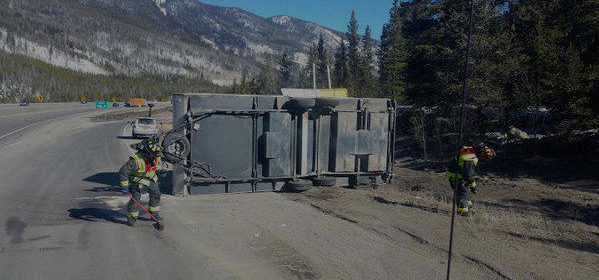

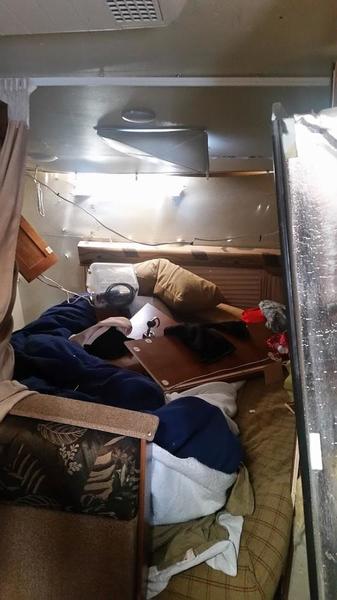
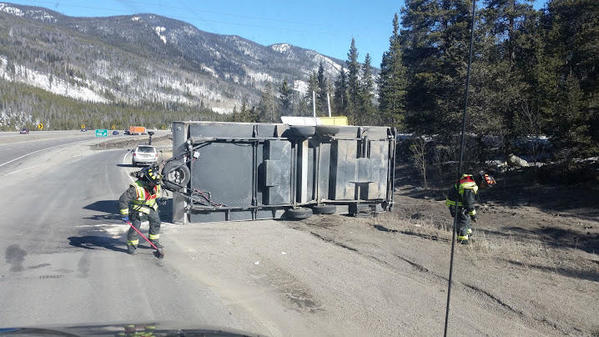

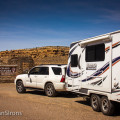
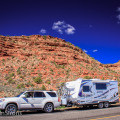


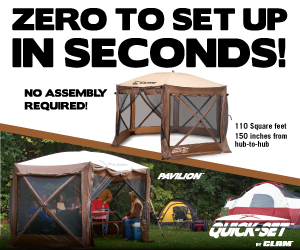
50 Comments
I’ve been in those ruts in an F550 box truck and we swayed back and forth alot.
The sway does not happen on the first day. There are a lot of people never experienced sway for many years and then it just happens one day. You never know when it can happen. The author installed Anderson hitch (weight distribution+sway control), but thing is.. it helps, but it does not eliminate the sway. It can happen and the sway bar will bend like plastic as the author experienced. Hensley or ProPride hitch is about $3k, it’s expensive. But, you need one of those if you want to eliminate the chance of sway. It just works like fifth wheel.
A bigger truck definitely helps, but it can still happen.
You need a better sway controller.
Anyway, it’s fortunate that no one was hurt.. it’s really scary..
This sounds more like driver error than the TV – slamming on the brakes while towing at highway speed is almost certain to cause an accident no matter how big the TV. If you’re lucky, the trailer’s brakes are good and stop it from going faster than the TV and this coming around the TV.
Ok, I need anybody’s suggestions and opinions on this. I bought a 2003 Rockwood ROO 21 weighting hitch 324lbs and dry weight 2553 lbs total 2,877lbs. I live in North Carolina but had to drive to New Jersey to get the travel trailer. I own a 2004 Lexus RX330 and a 1999 Lexus RX 300x I used my 1999 Lexus RX300 to pick up the travel trailer in New Jersey. The towing capacity for the 1999 Lexus RX 300 max at 3,500lbs. Subtracting 2,877 from 3,500 = 623lbs. I purchased a weight distribution system to prevent sway and rollover jackknifes. Which has a total weight of less than 300 pounds. I was able to drive all the way home from New Jersey with no swaying or weight distribution problems )even had to jam brakes), to about 15 minutes from my house driveway after stopping for fuel when my Lexus began to strain and knocking until completely stopping. The whole trip back was a little strained and gas refills became more frequent than driving without the trailer. Because of low oil level I blow the engine and was forced to sell the Lexus as junk parts. I must say maybe if I paid more attention to the oil level although no light indicator came on I might have been able to save the Lexus. But I think if it was to breakdown on me I’m glad it happened the way it did because I would have hated being in a far distance and breakdown. So, here is what I need advice on. Im ready to stay within a budget of $5,000 for a used vehicle that will be gas sufficient, V8 engine preferably, capable of towing 3,500 but maxing at 7,200, preferably another small to med-size SUV or tuck that is Toyota made. I was going for a 4Runner but also considered a tundra or Tacoma. I have 5 dogs that I will travel with and not all of them are car trained to know not to relieve themselves in a vehicle. A truck such as the tundra with extended cab or larger with a camper would be best for my dogs. So. Please tell me what I should go with. In this order is the importance 1.V8 4Runner 2. Tundra with extended cab 3. Tacoma with extended cab. Please explain why you would choose what you chose so I can understand the pros and cons and benefits of the vehicle I will continue using the weight distribution and electronic brake system with whatever I chose.. Thanks!
Ok, I need anybody’s suggestions and opinions on this. I bought a 2003 Rockwood ROO 21 weighting hitch 324lbs and dry weight 2553 lbs total 2,877lbs. I live in North Carolina but had to drive to New Jersey to get the travel trailer. I own a 2004 Lexus RX330 and a 1999 Lexus RX 300x I used my 1999 Lexus RX300 to pick up the travel trailer in New Jersey. The towing capacity for the 1999 Lexus RX 300 max at 3,500lbs. Subtracting 2,877 from 3,500 = 623lbs. I purchased a weight distribution system to prevent sway and rollover jackknifes. Which has a total weight of less than 300 pounds. I was able to drive all the way home from New Jersey to about 15 minutes from my house driveway after stopping for fuel when my Lexus began to strain and knocking until completely stopping. The whole trip back was a little strained and gas refills became more frequent than driving without the trailer. Because of low oil level I blow the engine and was forced to sell the Lexus as junk parts. I must say maybe if I paid more attention to the oil level although no light indicator came on I might have been able to save the Lexus. But I think if it was to breakdown on me I’m glad it happened the way it did because I would have hated being in a far distance and breakdown. So, here is what I need advice on. Im ready to stay within a budget of $5,000 for a used vehicle that will be gas sufficient, V8 engine preferably, capable of towing 3,500 but maxing at 7,200, preferably another small to med-size SUV or tuck that is Toyota made. I was going for a 4Runner but also considered a tundra or Tacoma. I have 5 dogs that I will travel with and not all of them are car trained to know not to relieve themselves in a vehicle. A truck such as the tundra with extended cab or larger with a camper would be best for my dogs. So. Please tell me what I should go with. In this order is the importance 1.V8 4Runner 2. Tundra with extended cab 3. Tacoma with extended cab. Please explain why you would choose what you chose so I can understand the pros and cons and benefits of the vehicle I will continue using the weight distribution with whatever I chose.. Thanks!
Ok, I need anybody’s suggestions and opinions on this. I bought a 2003 Rockwood ROO 21 weighting hitch 324lbs and dry weight 2553 lbs total 2,877lbs. I live in North Carolina but had to drive to New Jersey to get the travel trailer. I own a 2004 Lexus RX330 and a 1999 Lexus RX 300x I used my 1999 Lexus RX300 to pick up the travel trailer in New Jersey. The towing capacity for the 1999 Lexus RX 300 max at 3,500lbs. Subtracting 2,877 from 3,500 = 623lbs. I purchased a weight distribution system to prevent sway and rollover jackknifes. Which has a total weight of less than 300 pounds. I was able to drive all the way home from New Jersey to about 15 minutes from my house driveway after stopping for fuel when my Lexus began to strain and knocking until completely stopping. The whole trip back was a little strained and gas refills became more frequent than driving without the trailer. Because of low oil level I blow the engine and was forced to sell the Lexus as junk parts. I must say maybe if I paid more attention to the oil level although no light indicator came on I might have been able to save the Lexus. But I think if it was to breakdown on me I’m glad it happened the way it did because I would have hated being in a far distance and breakdown. So, here is what I need advice on. Im ready to stay within a budget of $5,000 for a used vehicle that will be gas sufficient, V8 engine preferably, capable of towing 3,500 but maxing at 7,200, preferably another small to med-size SUV or tuck that is Toyota made. I was going for a 4Runner but also considered a tundra or Tacoma. I have 5 dogs that I will travel with and not all of them are car trained to know not to relieve themselves in a vehicle. A truck such as the tundra with extended cab or larger with a camper would be best for my dogs. So. Please tell me what I should go with. In this order is the importance 1.V8 4Runner 2. Tundra with extended cab 3. Tacoma with extended cab. Please explain why you would choose what you chose so I can understand the pros and cons and benefits of the vehicle. Thanks!
You lost me at trouble free 3 years then wife driving! We equipment was fine!
Go heavy with the tow vehicle and your trips will be more enjoyable. stay out of the wind gusts and heavy rains. sounds simple, but a little planning and adjusting of plans can make a huge difference in having a safe, enjoyable trip or a problem trip. I pull a 21 foot 4550 weight travel trailer with an f150. never a problem and always a pleasure.
I hope my example doesn’t muddy water too much. I have a 30 foot fiberglass Vista trailer bought new in 1999. I have towed it with a 1995 Chevy Lumina minivan with the 3.5 litre engine (gutless wonder), a 2003 Honda Odyssey with a 3.5 litre V6 (way more powerful), and most recently a 2008 diesel 3 litre V6 Grand Cherokee(amazing pulling power but expensive maintenance. We have towed it more than 30.000 km/19.000 miles) from Nova Scotia to Alberta with no issues.
People frequently suggest my rig is insane. They are wrong because I have many professional modifications done to the trailer, the trailer itself is highly aerodynamic, and the dealer is an Air Stream dealership in south-west Ontario who is very knowledgeable in setting up our rig. All 3 conditions are required to create a safe rig. I also PRETEND I’m an 18 wheeler driver or a commercial pilot (neither of which is true) when I slip into the driver’s seat, to make sure I put myself into the correct mindset when I’m heading down the road.
Briefly, I will cover a bit of the modifications. The hitch is strengthened with welding to the car frame, a transmission rad is added, anti-sway bars and weight distribution bars are added.
The trailer itself is designed for improved aerodynamics – it is only 2 steps to the ground instead of the usual 3, the roof is sloped to the left and right (like an upside down tin boat), the walls 5.5 feet rising to 6.2 feet in the middle of the ceiling, the walls and ceiling are one-piece fiberglass, the front has an exaggerated slope down, and the GVWR rating is 7000 lb. Clean, grey, and black water tanks are grouped around the twin axles as are the two propane bottles. The tongue weight is 440 lb. The 1 and 5/16 ball is angled slightly forward, and the receiver is as close to the rear bumper as possible.
The most critical part of the setup is finding a dealer who knows what he is doing. Our dealer is very well known in the RV community, and he is either loved or hated. I would suggest you chat with him, read his columns in RV Lifestyle magazine, and make up your own mind. We have used his services with our 30 footer three times. On two separate trips it was necessary to do an 8 wheel lock-up on the highway. The trailer created a lot of black smoke, and stayed straight as I pumped the brake pedal and used the manual override on the electric brakes. The vehicles behind us had difficulty slowing down as fast as us and I had to reduce some of the braking pressure to give them additional stopping room, but we did stop safely.
Although I have taken the rig up to 120 kph (about 70 mph) I almost always drive below the speed limit to maximize mileage.
So there you have it. I’m not trying to send business to the dealer, Andy Thomson at CanAm RV. Instead I’m sharing my towing experience with you so that you may have more options in how you choose your TV, TT, and installer – Whatever you do, do your homework.
HA! I have a similar story but will keep it short. I went to the same dealer (CanAM) to modify my SIENNA MINI VAN! I tow a 33ft ultra light at 5200#. I’ve towed it to Florida from Michigan. Similar setup…sway bars, welded hitch (trans cooler came stock) but I also have electronic sway control. Pulls like a champ…won’t win any races but been towing for three years.
I haven’t read through all the answers – but if your trailer is within 2/3 of your vehicle’s towing capacity (loaded) and is swaying, then I would really take a look at how the trailer is being loaded. If you have good load distribution, balanced to side and with 60% of the weight at the front of the trailer, it shouldn’t sway. If you’ve loaded up the rear cargo area and piled stuff on the bed in the back, etc., you’re much more prone to sway. Good luck.
If this helps, Ive been towing a coachmen 21tqx @3600 dry weight for 8 yesars with a 2011 Toyota 4runner V6, 17″ wheels. I use a Blue Ox weight distribution/ sway control System and have not had any problems. As long you set the system correctly and load your trailer correctly you should not have any issues towing with a 4runner. Sway starts, hit brake controller.
Glad everyone is OK
I’m reading a lot of comments about sway — I resolved that completely with my choice of hitch. I got a Pro Pride 3P hitch, which, through design, TOTALLY eliminates the possibility of sway. Physically, the trailer just can’t wag the tow vehicle. Not cheap, but well worth it!! Absolutely no sway when being passed by semi’s, and when there were 40 mph side winds, gusting to 60, and at the time, I was towing with an FJCruiser, the entire TV/TT were being pushed sideways as a unit, which was easy to control. Current info: 2006 4Runner V8 4WD, 2011 Rockwood Roo 21SS, 4,482 lbs dry. I feel totally safe with my setup due the hitch.
It doesn’t matter if it is a 4 Runner or a Semi truck. If the trailer starts to swing on you, the only way to save it, is to grab the manual handle on the vehicle’s electric brake controller and apply maximum brakes on the trailer to pull the rig straight. As soon as you lock the trailer brakes (and who cares about tire ware) the rig will straighten and you can apply the vehicle brakes to slow the rig down. My mother had the same situation happen and wrecked their new trailer, only she knew to get on the trailer brakes but the seat belts locked up when the trailer started to sway and she couldn’t reach the controller. MUST HAVE CONTROLLER WHERE YOU CAN REACH IT SITTING UP RIGHT IN THE SEAT. not down under the dash some place you can’t reach it. The one improvement to a vehicle like a 4 runner I would do is to put a heavier tire like a load range C on the rig for stiffer side walls. better control.
Ok read all this good info and still wondering if our 2014 Highlander Awd, rated to 5k towing will do the trick on a Freedom Express with dry weight of 3800-4000.
Although we do plan to put items in the trailer we would leave fresh water out while traveling. The goal would be to keep GVW under 4750 lbs.
Also looking at Apex Nano, and it comes in about 500 lbs less.
Will that 500 make that much difference?
I have been towing boats up to 3-4K weight so I do have 40 years of towing experience
I agree the vehicle was more than likely not the cause of the original story, but think all the input form everyone was really helpful.
Also very happy the wife was ok.
Thanks all
Yes, 500 lbs., Is a difference!
Fact is, the V8 4Runner May be rated for 7000-7200 pounds but really isn’t. All 4Runners made from 2010 and on are rated for 5000 pounds and their V6 engines are just as powerful as the old v8.
Those pre-2010 4Runners were tatted under a different standard. Example: a 2009 Sequoia 5.7 is rated at over 10,000 capacity under the old standard. Yet, an IDENTICAL 2010 Sequoia 5.7 is deratedvto only 7000-7200! And there is NO COMPARISON between the tow behavior of my Sequoia and the 2005 4Runner V8 I traded in. I was trying to save money with the 4Runner…but it ended up costing me more! Go with a Sequoia and save yourself a lot of angst!
MIght be helpful to know what you were towing.
This has been a great thread with loads of really good and experience based information. My only question is if anyone thinks there is a safe weight to tow with the 4 runner or even a highlander? I’m hoping a 3000 lb rig would be ok. Your thoughts?
I’m glad I read this and everyone/thing turned out fine. I was contemplating selling our GMC Duramax 1T to use our V8 4Runner as our tow vehicle instead. NO MORE! Our 23′ travel trailer is heavier than the Lance…and it sounds like that would have been a potentially dangerous move.
Does anyone know if a weight distribution hitch and/or anti sway bar was installed on the trailer?
Sounds like there were sway bars, according to the author. Don’t know about the distribution hitch. Pretty scary.
Yes. Article stated it was an Anderson No Sway…pretty good units from what I hear.
I’m glad your wife is okay and thanks for letting us know about it. I have a 2010 4Runner and I plan on doing a 12 month trip around North America is 2019.
I’m currently looking at and researching what trailer to use. I’ll be doing the trip by myself. I’m currently interested in 16′ or 17′ Casita, Scamp, and T@B. I also like the 15′ Autumn Ridge hybrid. I’d especially love to use a Airstream 16′ Bambi, but I don’t happen to have $45k laying around. Two of the important things for me are resale value & simplicity/K.I.S.S (Keep It Simple, Stupid). Unfortunately, I plan on selling it after I’m done because I live in a little townhouse so I have nowhere to store it. So, Casita is that I’m thinking right now because of it’s resale value and simplicity.
I spent 10 weeks this summer (2017) exploring New Mexico, but I also have no place to store a trailer. I bought a modest new Jayco bunkhouse model, figuring it would resell easily and I’d take a modest loss.
Including sales tax, I lost $3,000 on an outlay of $13,000. I’d do it again, and probably will.
How anyone can equate “panicked driver” to “inadequate vehicle” is beyond me. Terrible title for a very misleading article.
agreed. I’m sorry if you aren’t used to pulling a trailer you should not trust a dealership to tell you what is safe.
We’ve been looking at the Lance 1985 (GVWR of 5600#)and plan to tow with our Sequoia tow capacity of 7200# but now am wondering if we need to either go lighter or change tow vehicle……
It depends on what you load the trailer with, keep it simple, no water or propane, get it later!
I agree! If you’re careful and experienced with stabilizers, no problem! You will not blow a Runner, more importantly, brakes!
Hello group. Thanks for all your information. I have an 07 4runner v6 and I work on the road. I was contemplating on making a camper purchase in the next few days so my family could stay with me from time to time. The camper I’m looking at is quite heavy 5100lbs dry. I wouldn’t actually pull the camper outside of a 200 mile radius it would be left in storage until I need it. So what I’m asking is would the v6 be “ok” for short hauls on flat roads?
Hi Jared! We wouldn’t tow a 5100# dry trailer with a v6 4 Runner. I think our 4 Runner weighed less than 5000#. Not safe in our opinion.
I am looking at a 4Runner – a 2WD one – to tow a little T@B trailer (under 1,700 lbs) because of the very reason of making sure I have plenty of towing ability but the question is – is it a given that I should only consider a 4 wheel drive? I keep seeing a lot of people saying they’ve driven a 4Runner but 2 wheel or 4 wheel? Thank you! Anne
Hi Anne! I think the 2 wheel drive 4 Runners may have more towing capacity than the 4 wheel drive. Ours was a 4 wheel drive for the snow and ice in Illinois. Check it out, but be safe & have FUN! Cheers! Jan
2 we is fine with you’re weight, don’t load water or propane til you get to where you’re going..
Interesting story. I’ll agree with several others here that the choice of tow vehicle wasn’t an issue here. Case in point, the 5 wheel trailer that wrecked in the same spot.
Anyway, thanks for posting this. Its important we try to understand and learn from the failures experienced by others. But that happens so rarely that its almost a superpower.
When the trailer starts to wag the tow vehicle, ease off the tow vehicle brakes and apply manual braking to the trailer with that manual control thingee on your brake controller. The rig will straighten out and be controllable again.
This needs to be instinctive, because trouble happens fast. Practice before hitting the road, or you may well hit the road.
We just changed our tow vehicle from a 2014 4Runner to a 2017 Ram 1500 for a 20′ Grey Wolf 19RR and what a difference this is making. Towing just feels more secure.
Honestly, it’s very hard to find a tow vehicle that’s comfortable unless it’s overpowered and heavy. I’ve towed a5k 24 ft with my Tacoma with the same drive train as the 4 runner. It does way better than I expected. It does have a 6K+ tow rating. I now have a much bigger and more powerful silverado and I’m not impressed by the difference. When you pull a box down the road it’s never easy. I recommend a truck that weighs as much as the trailer with can carry a payload of double the hitch weight.
I hope you’ve realized by now that the vehicle was not the problem. The problem was a poorly loaded trailer and poor towing practices. Trailer sway is not only predictable, but also relatively easily managed by proper weight distribution. And I’m not talking tongue weight – although that’s important as well. The physical formula for tow sway is relatively easy to understand for engineers, but for the lay person it’s a bit harder to just look at the formula and apply to your daily use. The three factors are distance from hitch to axle (of the trailer) average distance of load from axle center, and distribution of weight relative to the axle center fore and aft. You can’t change the first factor and hopefully Lance did a decent job with it. The second factor is probably where you failed in this case. You loaded your stuff at the ends of the trailer not in the middle. That’s bad. That induces sway. Weight needs to be as centered over the axle as possible. Weight moved further away from the axle center can overcome the tongue weight factor pretty quickly. And the sway will be induced as a result. I’d bet you had a lot of gear on the back and in the front, along with empty or half full holding tanks.
An F150 would like have no difference in the outcome. It’s rear axle is typically lighter than that of the 4runner. There are certainly other advantages like power and extra space, but I don’t think the outcome would have any change in this scenario.
The solution is proper trailer loading. Don’t put heavy stuff in the ends. Put them in the middle. Also it appears that Lance has the fresh water in the front and the gray and black water tanks aft – further from the axle. Having full waste water tanks and empty fresh water tanks could significantly alter the weight balance. This is a poor engineering decision on the part of the manufacturer. All of which likely combined to cause your accident.
Glad you’re okay. Best of luck in your future towing!
Jim,
You seem really knowledgeable- we are having trouble deciding on the vehicle we need for towing an rpod 178- figure wgt is 2800 empty want to add bikes (100 lbs) and standard camp stuff. Love the 4 runner idea – but wonder about the safety of towing that wgt> If we’re looking at a 2016 or 2017 would that be a dumb idea, should we go for a Sequoia (which we really don’t want to do), and really don’t want to have to get a truck?? Live in Denver area so would be going up Vail Pass etc, but are willing to go slowly. Any help appreciated.
Ann
Hi Ann! Your RPod would be several hundred pounds lighter than our Lance 1685 is loaded. If the 2800 net weight increases to 3800 lbs with “stuff” and another 100# for bikes, your total would be somewhere around 4000#. The max towing on a 4 Runner is either 4500 or 5000 lbs. Add the appropriate equipment (tow package w/ transmission cooler, brake controller, weight distribution hitch etc) and it should tow just fine.
Not sure what you think of a small truck, but we looked seriously at the GMC Canyon diesel. Upside is they tow about 7000 lbs giving you a bit more uupphhhh but when I was sitting in it & test driving, it felt almost identical to our 4 Runner. Driving in the mountains was definitely more challenging in the 4 Runner than our Tundra.
Cheers! Jan
Hi Jim. I’m midway on a cross country trip from San Diego to nashville. I’m driving a 2006 4Runner V8 & pulling a Tahoe Lite 25’ travel trailer. I have spent more time off the road reading about towing & making adjustments to my weight in my 4Runner & trailer than I have time on the road. I’m pushing max on both vehicles & find even the slightest adjustment can make a big difference. I do have an EZ Lift Weight Dist 10,000lb & anti sway bar. I’m sitting In a Tucumcari NM reading AGAIN & considering alternative routes to Nashville to get off the 40. The semi’s are exhausting & I’m burnt out on extreme hyper vigilant driving to keep my vehicles from getting whipped around by them zooming past at 70mph.
In addition, I’m wondering if filling my empty fresh tank at least 1/3 would help as I did begin to notice a bit more bouncing with the trailer after dumping in Yuma.
Thirdly, my weight estimates are based on manufacturers figures along with my having weighed some of my load & estimating the rest. I did go to a weigh station it’s the SD city dump with a trailer & 4Runner I’m estimating to be slightly heavier than my current load. The car & trailer combined was 11,000.
4Runner
GVWR 5490
Tow capacity 7300
Trailer
“Dry” 3800
GVWR 5600
I did some weighing of the car load at my last stop & est at 5200 loaded, distributed fairly equally over axles & left to right. That seem to help some.
So, any advice on adding to fresh water tank, finding alternative route to avoid semis and the weight? In specific, i haven’t had weight checked & don’t know where to do that in addition to if you feel I’m taking too big a risk with a packed load. The trailer has been as evenly distributed mostly over the axle, pretty good left to right & items positioned on or as close to the floor as possible.
Anyone else feels like adding a response to my very lengthy post (sorry!) I’m all ears!!!
Sommer
SD to Nashville Rd Trip – Paused in Tumacari NM…
The best part of this whole story is your bride was unhurt! It could have been, well, worse.
While I drove big trucks, I had a couple of harrowing experiences, but the most memorable was when I was hauling an empty trailer in a surprise snow storm. For reference, an empty semi trailer weighs about the same as the tractor and about 6 times as much when fully loaded.
Crawling along in a strong side wind, the trailer stepped out on the fresh snow and was being hauled by the tractor at a 30% angle across the lane next to me. Had I let off, the trailer surely would have just kept going and a wreck would follow immediately afterward. Had I applied the trailer brake, the trailer would have swung quickly back the other way and, yes, a wreck would have ensued. What to do? I kept a little fuel going until the trailer calmed down and returned to its position behind the tractor.
This all happened at a slow speed and I had a lot of experience. The weight of the tractor vs the trailer weight didn’t really mean much. Using the trailer brakes (which is not one’s first thought) would have been very wrong, and applying the tractor brakes would have been a disaster. Experience saved the day. Get out there and experiment, learn, and practice. Driving well is a skill just like skiing, playing the piano, cooking or golf. OK, golf is more about luck, but you get my point.
Thanks Russ! You’re right, more practice makes better drivers – especially when towing! Cheers! Jan
We recently purchased a 2013 Lance 1575 from Pete of Kramer’s Kamper. We will be towing with our Nissan Pathfinder. So far with a few short trips it been great. The test for us will be our trip to Colorado Springs this summer.
Congratulations Don! Pete’s the one that equipped our original 4 Runner for towing our 1685, so I assume you’re in good hands with any necessary equipment for your tow vehicle – weight distribution hitch, brake controller, extended mirrors, etc. Enjoy your Lance 1575 & trip to Colorado Springs! Cheers! Jan
Frankly, what should have been done is to apply the trailer brakes in a sway situation using the brake controller. Never apply the tow vehicle brakes. Of course, that procedure is counterintuitive and must be known and thought about often (i.e. Practiced in your mind…just in case). I think this accident would have happened with an F-150 as well given the account of the accident. That being said, the heavier the tow vehicle as well as the much longer wheelbase of a full sized pickup truck helps control a trailer better.
Thank you for sharing this. We have 2016 4Runner and tow our Lance 1685 with it. It’s been intimidating at times because we can’t see well on the sides even with extended mirrors. So far we have had good experiences, but I still feel very tense towing it.
Before we started towing I read the 4runner manual and made my husband and I memorize this… when trailer sway situation occurs let go of the gas and continue to travel straight, do not hit your vehicle breaks, but use your electric breaks to slow down the trailer. We have practiced that on a small sway situations downhill in windy areas. It’s hard to do in a moment of panic I’m sure, but we keep practicing to reach for electric break and slow down the trailer before slowing down a vehicle. I has to be down to muscle memory – towing is no joke, no matter how light the trailer is.
So glad to hear everyone is safe and now wondering if we should consider Toyota Tundra or F150 or even 250. This is a good lesson to read about. Thank you.
Every situation is different, but we are happy we changed tow vehicles from a 4 Runner to a Tundra. As Tom mentioned, the 4 Runner did the job – we called it our “little engine that could”, but we encountered no serious situations in our 10,000 miles from the Midwest to East Coast to the 4 Corners region and back to Midwest. Having said that, the Tundra just feels more solid, less marginal. With the Tundra we have to REMEMBER the trailer is back there, with the 4 Runner, we always KNEW it was back there.
We drove 4 Runners for the previous 16 years (but weren’t towing a trailer), so the decision was not taken lightly. As suggested, we too will be checking out how to use the electric trailer brake in a sway situation, we’ve never done it and should practice ahead of time! Thanks!